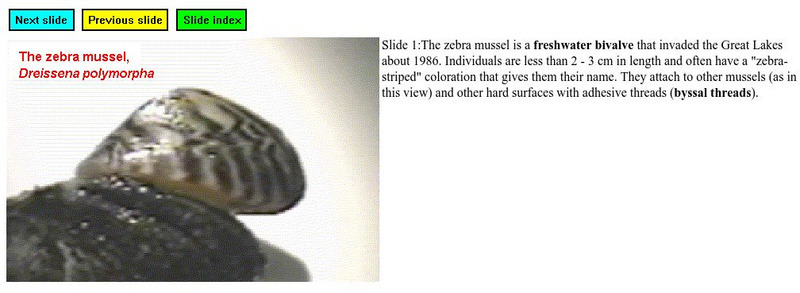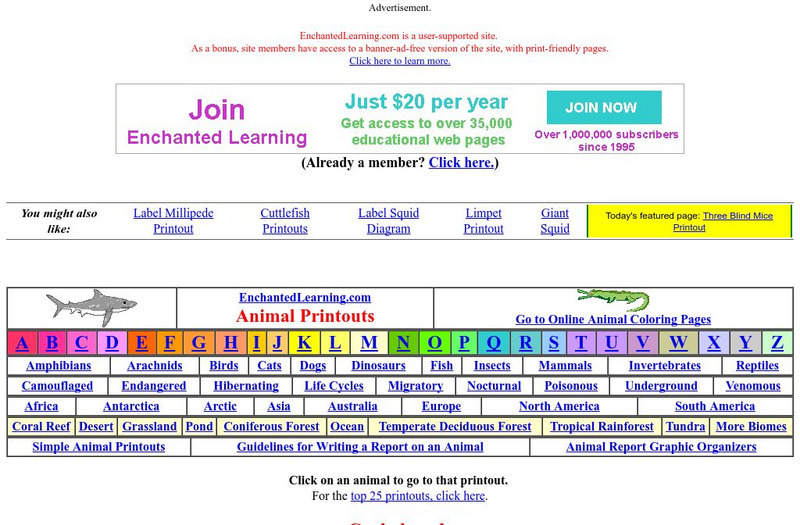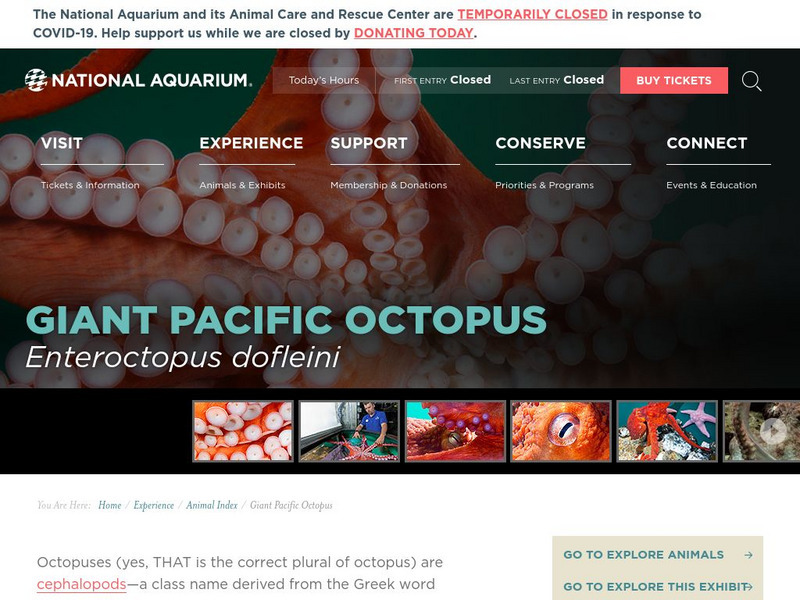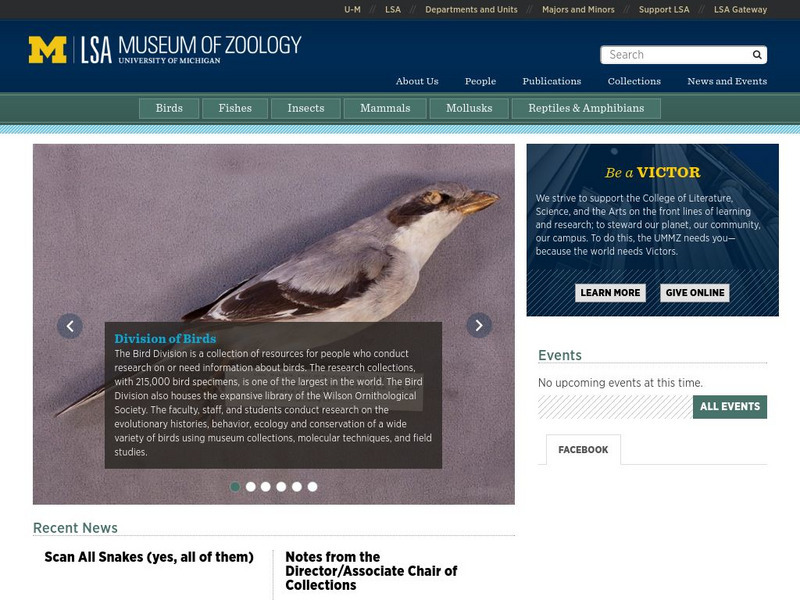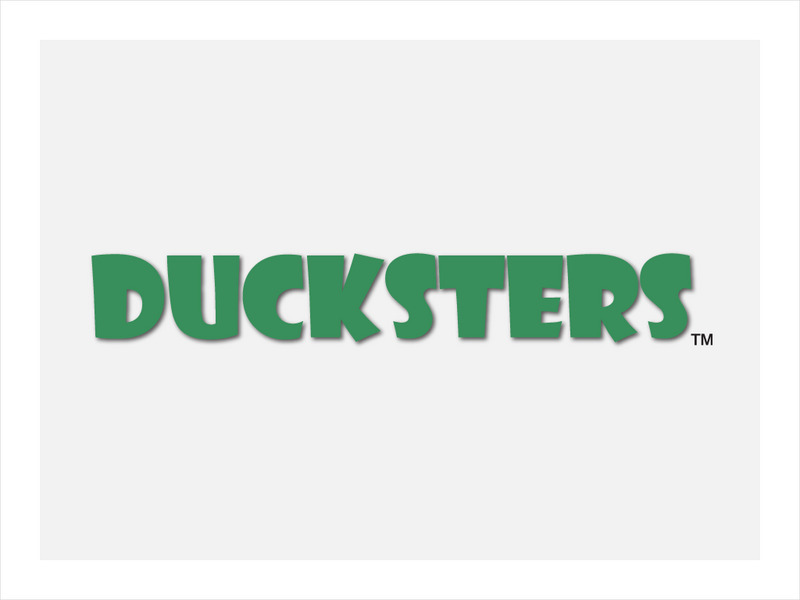Other
Conchologists of America: What Is a Shell?
General description of how long mollusks have been around. Also includes very general facts about mollusks in general.
PBS
Pbs: Scientific American Frontiers: Shell Game
A companion to a PBS program, this Jeopardy-style game test students as they identify the characteristics of mollusks.
Other
Zebra Mussel Page: Zebra Mussel Slide Show
Click through the whole slide show to find basic information on zebra mussels, how they live, the problems they can cause, and possible solutions.
US Fish and Wildlife Service
Discover Freshwater Mussels: America's Hidden Treasure
This resource explains the critical role that mussels play in the United States.
Other
Mollusca
A general description of mollusca and some discussion of those found in the waters of Great Britain.
Other
Wonders of the Sea
Good general description of the phylum with subordinate descriptions in each of the classes.
Enchanted Learning
Enchanted Learning: Cephalopods
This site provides links to elementary information about cephalopods. Students and teachers will find links to the blue ring octopus, the giant squid, the cuttlefish, octopus and more.
University of Massachusetts
University of Mass.: Freshwater Mussel Reproduction
This site, which is provided for by the University of Massachusets, gives a very good example of a typical bivalve reproductive cycle.
PBS
Pbs: What's Killing the Oysters?
A special report provided for by PBS on what's killing the oysters of Ago Bay in Japan.
Other
Octopus of California
Twenty great pictures of octopi from California. This site also offers up close pictures of invertebrates, squids, and tidepools.
Other
The Cephalopod Page: What Behavior Can We Expect of Octopuses?
The navigation and spatial skills, tool use, play, and personalities of octopuses are covered in the studies discussed in this article.
Famous Scientists
Famous Scientists: Shintaro Hirase
Ever wondered what a malacologist studies? Find out by reading this short biography about Japanese malacologist, Shintaro Hirase.
University of Florida
Florida Museum of Natural History: Homepage
This site from the Florida Museum of Natural History gives the current events, information about the museum, exhibits and public programs, research and collections, links, etc. to the Florida Museum of Natural History.
Other
National Aquarium: Giant Pacific Octopus
A thorough site that describes the physical characteristics of the Pacific Octopus, examines its diet and habitat, and references its natural predators.
University of Michigan
University of Michigan: Museum of Zoology
See the Museum of Zoology where visitors can explore the museum's resources.
Enchanted Learning
Enchanted Learning: Giant Squid
What makes a giant squid unique? This site features a diagram and some information about this cephalopod. Students can learn about the giant squid's anatomy, diet and more through this resource.
American Museum of Natural History
American Museum of Natural History: O Logy: Bahamas: Creatures of the Reefs
Biologist Paula Mikkelsen, who studies mollusks among the coral reefs in the beautiful waters of the Bahamas, explains her work.
Wikimedia
Wikipedia: Pearl
This site from Wikipedia provides a general overview of the pearl, a hard, rounded secretion formed inside the shell of mollusks.
Ducksters
Ducksters: Animals for Kids: Invertebrates
What is an Invertebrate? Kids learn about these animals that have no backbone such as worms, mollusks, insects, and spiders.
MadSci Network
What Is the Life Cycle of the Sea Snail?
Good description of the molluscan life cycle as a way of answering the question in the title.
Australian Broadcasting Corporation
Australian Broadcasting Corporation: News in Science: Monsters of the Deep
This site from the Australian Broadcasting Corporation explains the uses and effects of an octopus's poison. The information that is presented is somewhat brief, but factual, and worth checking out on the subject.
PBS
Pbs: Nova: Making Stuff: Stronger
The first in a four-part PBS series, hour-long video defines "strength" of materials, with examples ranging from steel cables to mollusk shells. Insight from research and experts offers a look into the process of "re-engineering"...
Other
National Aquarium in Baltimore: Squid Lab [Pdf]
This handbook is intended to be used before and after an aquarium visit but can be used on its own. It has information about cephalopods, with a focus on the squid. Students learn about squid anatomy and physiology, survival adaptations,...
Other
Black Hills Institute of Geological Research, Inc.: Ammonoids
Ammonoids, more commonly referred to as Ammonites, are the extinct ancestors of today's octopus, squid and nautilus. This page provides excellent information about these creatures, as well as diagrams and pictures.
Other popular searches
- Arthropod and Mollusks
- Mollusks and Dichotomous Key
- Bivalve Mollusks
- Mollusks Prey
- Mollusks Web
- Water and Land Mollusks
- Water Mollusks Land Mollusks
- Bivalave Mollusks
- Water Mollusks
- Mollusks Used as Food
- Univalve Mollusks
- Mollusks Prey and Predators


